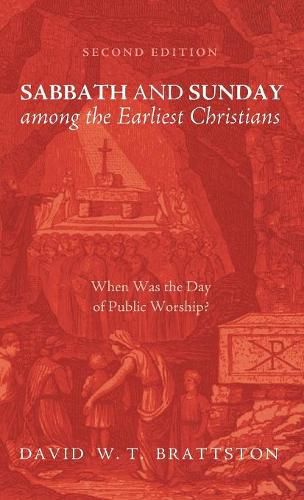Readings Newsletter
Become a Readings Member to make your shopping experience even easier.
Sign in or sign up for free!
You’re not far away from qualifying for FREE standard shipping within Australia
You’ve qualified for FREE standard shipping within Australia
The cart is loading…






This title is printed to order. This book may have been self-published. If so, we cannot guarantee the quality of the content. In the main most books will have gone through the editing process however some may not. We therefore suggest that you be aware of this before ordering this book. If in doubt check either the author or publisher’s details as we are unable to accept any returns unless they are faulty. Please contact us if you have any questions.
According to Christian sources from before the middle of the third century AD, the ancient evidence is unanimous that, although there were a few slight differences as to how weekends should be observed, one thing is certain and was uncontroversial: the main day of the week for early Christians to gather and worship was not the seventh-day Saturday Sabbath, but Sunday, which they sometimes called the first day or the eighth day, or the Lord’s Day. The booklet also considers (1) whether the Lord’s Day replaces the Sabbath, (2) whether the Sabbath was abolished, (3) whether Sabbath-keeping is forbidden, (4) whether the Roman Catholic church changed the Sabbath to Sunday, (5) whether Sunday is to be a day of rest as well as the chief day of public worship, (6) a critique of sources and authorities on which Sabbatarians rely in advancing their contentions, (7) whether some Christians before Constantine observed Sunday rather than Saturday to prevent the Roman government from considering them to be Jews, who were allegedly persecuted before his reign, and (8) where readers can find translations of the sources for themselves. Focusing on pagan Roman and Jewish sources, this second edition considers whether Sunday-keeping began as a result of the Jewish revolts of AD 66-70 and/or AD 132-135 and examines the work of Samuele Bacchiocchi.
$9.00 standard shipping within Australia
FREE standard shipping within Australia for orders over $100.00
Express & International shipping calculated at checkout
This title is printed to order. This book may have been self-published. If so, we cannot guarantee the quality of the content. In the main most books will have gone through the editing process however some may not. We therefore suggest that you be aware of this before ordering this book. If in doubt check either the author or publisher’s details as we are unable to accept any returns unless they are faulty. Please contact us if you have any questions.
According to Christian sources from before the middle of the third century AD, the ancient evidence is unanimous that, although there were a few slight differences as to how weekends should be observed, one thing is certain and was uncontroversial: the main day of the week for early Christians to gather and worship was not the seventh-day Saturday Sabbath, but Sunday, which they sometimes called the first day or the eighth day, or the Lord’s Day. The booklet also considers (1) whether the Lord’s Day replaces the Sabbath, (2) whether the Sabbath was abolished, (3) whether Sabbath-keeping is forbidden, (4) whether the Roman Catholic church changed the Sabbath to Sunday, (5) whether Sunday is to be a day of rest as well as the chief day of public worship, (6) a critique of sources and authorities on which Sabbatarians rely in advancing their contentions, (7) whether some Christians before Constantine observed Sunday rather than Saturday to prevent the Roman government from considering them to be Jews, who were allegedly persecuted before his reign, and (8) where readers can find translations of the sources for themselves. Focusing on pagan Roman and Jewish sources, this second edition considers whether Sunday-keeping began as a result of the Jewish revolts of AD 66-70 and/or AD 132-135 and examines the work of Samuele Bacchiocchi.